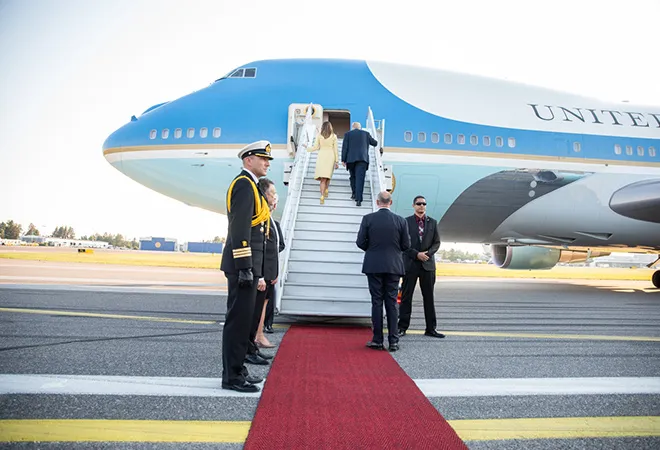-
CENTRES
Progammes & Centres
Location

The death of John McCain, a decorated Vietnam war veteran and long-serving US Senator from Arizona has once again underlined the growing political divide in America under the Trump Presidency. Instead of bringing the nation together, McCain’s death and US President Donald Trump’s reaction to it have brought to the fore the challenges America faces as it navigates through these difficult times.
At the end of last year, McCain, who strongly believed in the post Second World War global order and America’s key role in maintaining it, had written about the need to defend the “liberal world order.” For him, the rise of Donald Trump was a sign that all was not well in the liberal global space. Targeting the populists in the western world, McCain had bemoaned that “they have turned inward economically and prioritised protectionism over integration,” and “seem to have given up on the very idea of liberalism itself, betraying the underlying will that is necessary to maintain any world order.”
McCain was anti-Trump all along and the sitting US President has not been invited to his funeral while McCain’s other political rivals, George W Bush and Barack Obama, will be eulogising the late war veteran. Trump has reciprocated in kind. Despite being pushed by his aides to release a statement in honour of the late Senator, he only tweeted a perfunctory condolence message on McCain. Lowering the national flag at half mast was also apparently a big deal.
McCain’s death draws a line under an American approach to the world which touted American primacy and defended the liberal international order. There is little love lost for these priorities today amongst the ordinary Americans. Despite doing his best to shred the global liberal order to bits, Trump’s popularity among his base remains high. The more besieged Trump seems, the more sympathetic he seems to his base. Talk of his impeachment in the beltway has gained salience after fresh accusations of him passing hush money to women for his alleged affairs.
Speculation that Donald Trump may be impeached has been rekindled by fresh accusations that he paid hush money to women with whom he allegedly had affairs. Last week, Michael Cohen, Trump’s former lawyer implicated the President in off-the-books hush money paid to a porn star in his guilty plea. Paul Manafort, Trump’s former campaign manager, has also been found guilty of bank and tax-fraud charges. And then there is the Russia inquiry which hangs like a Damocles sword over Trump. While Trump cannot be prosecuted during his presidency, the only way remaining for his political opponents to remove him from office is by impeachment.
The process of impeachment is a cumbersome one and has to be started by the House of Representatives, needing only a simple majority to pass. The trial is held in the Senate where a two-thirds vote is necessary for the President’s removal. This has not yet happened in the US history. Bill Clinton’s case is a reminder that impeachment can take a political toll on those trying to remove the President.
Given the inherently political nature of the process of impeachment, the Democrats remain coy about declaring their intentions. They are only promising a serious investigation into Trump’s affairs if they take control of the US House of Representatives in the midterm elections. They don’t want to jeopardise their chances to get a majority in the House in November elections. They need 23 more seats to win control of the House. So they continue to underline that impeaching the President is not a priority for them. They are wary of energising the Republican base before the midterm.
But Republicans have seized upon this chance and are likely to use the threat of Trump’s impeachment to bring their voters out to vote in November, exhorting them to keep the Republicans in power to save Trump and his agenda. Rudy Giuliani, Trump’s lawyer and close aide has made it clear: “This election is going to be about impeachment or no impeachment.” Steve Bannon, Trump’s former chief strategist adviser, has warned that impeachment proceedings would be launched against Donald Trump in January if he fails to hold onto the House of Representatives.
The institution of the US Presidency, one of the most potent of political institutions anywhere in the world, today faces a crisis of credibility as it has been weakened considerably by Trump. American polity, meanwhile, is dysfunctional with the nation’s much-touted checks and balances barely managing to either check or balance.
In his final message to the Americans, the late Senator McCain suggested that the nation’s greatness is weakened, “when we hide behind walls, rather than tear them down; when we doubt the power of our ideals, rather than trust them to be the great force for change they have always been.” It is not hard to decipher the target of this message – Donald Trump – who is challenging the foundations of the consensus on which American foreign policy was based. By rolling back economic globalisation and making it starkly clear that his America is not keen on sustaining Pax Americana, Trump has managed to disrupt not only the global order but also in his own way the American domestic polity. It is not readily evident if American polity will be able to regain its equilibrium even after Trump has left the centre stage.
This commentary originally appeared in DNA.
The views expressed above belong to the author(s). ORF research and analyses now available on Telegram! Click here to access our curated content — blogs, longforms and interviews.

Professor Harsh V. Pant is Vice President – Studies and Foreign Policy at Observer Research Foundation, New Delhi. He is a Professor of International Relations ...
Read More +